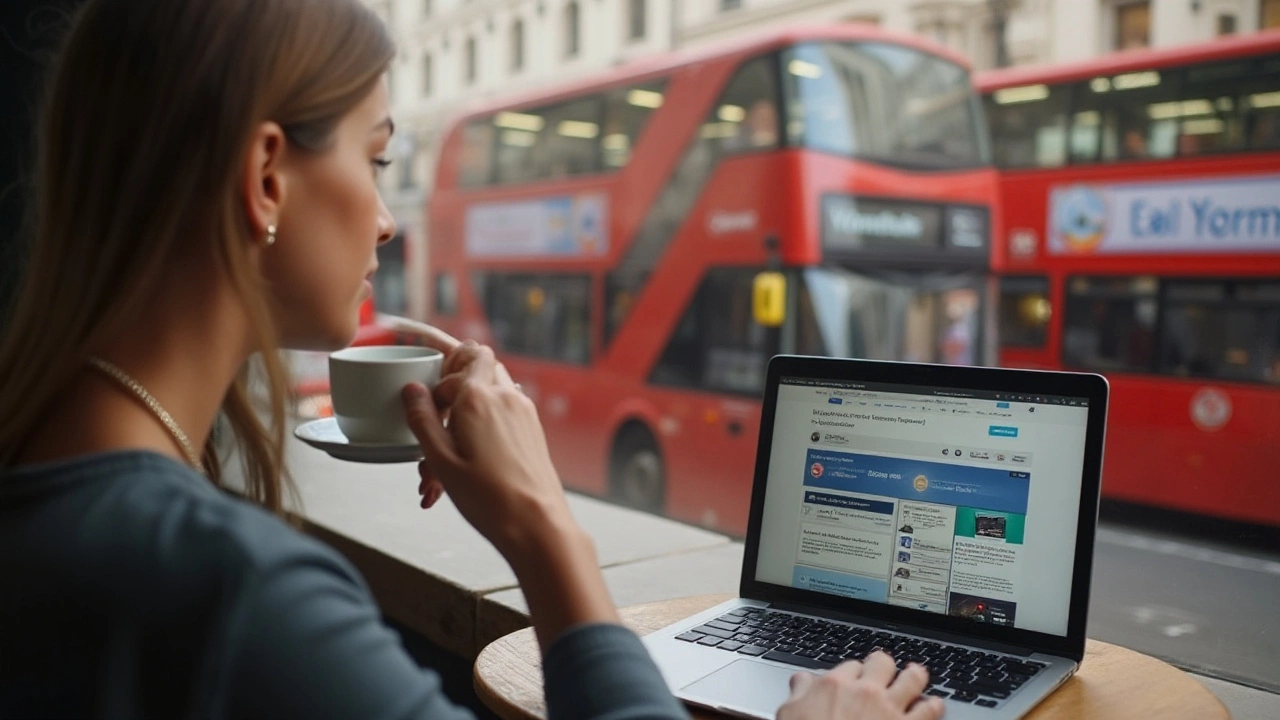Is Buying a House with No Money Down a Smart Move?
 Nov, 30 2024
Nov, 30 2024
In the realm of home buying, especially for first-timers, the concept of purchasing a home without the need for a hefty upfront payment seems like a dream come true. However, the allure of a zero-down mortgage comes with its fair share of considerations and potential pitfalls.
Let's dive into this intriguing topic, exploring the potential benefits, the associated risks, and some helpful tips to guide you through the process. Whether you're seeking to understand if purchasing with no money down could be feasible or just curious about how it all works, this article offers insights that are both refreshing and informative.
- Understanding Zero-Down Payment Options
- Benefits of Buying with No Money Down
- Risks and Downsides of Zero-Down Mortgages
- Government Programs to Assist Buyers
- Tips for First-Time Home Buyers
Understanding Zero-Down Payment Options
Buying a house often conjures up images of significant financial preparation, notably the daunting task of saving up for a substantial down payment. For many, this down payment can be a significant barrier to homeownership. However, there is an option that can make the dream of owning a home more accessible: the zero-down payment mortgage. This approach allows potential homeowners to bypass the traditional lump-sum payment, offering a path to purchase with little to no money upfront. But how exactly does this work, and what should you be aware of?
The most accessible option for a zero-down mortgage is typically through government-backed loans. The U.S. Department of Veterans Affairs offers the VA loan, exclusively available to veterans, active-duty service members, and some members of the National Guard and Reserves. This option is particularly appealing because it requires no down payment and often comes with competitive interest rates. Similarly, the U.S. Department of Agriculture provides USDA loans to those purchasing in designated rural areas, allowing buyers to secure a home without a down payment, but with income restrictions and property location requirements.
For those not eligible for VA or USDA loans, private lenders sometimes offer zero-down mortgage options, although these can come at a cost. These lenders might require mortgage insurance or charge higher interest rates to mitigate the risk they are taking by not requiring a down payment. It's crucial to thoroughly analyze the terms of such agreements and compare them to traditional mortgage options. Additionally, some financial institutions may offer first-time homebuyer programs that provide assistance or grants, potentially lowering the need for a down payment.
As Henry Pryor, a renowned property agent, notes, "No down payment doesn’t mean no cost. Buyers must be aware of other expenses involved."
Another critical aspect to consider is how a zero-down mortgage impacts long-term financial health. While it may alleviate the initial financial burden, it could lead to a larger monthly mortgage payment. With no equity put down, you'll owe the entirety of the home’s value from day one. This scenario might present challenges if the property value decreases, leaving homeowners owing more than the property is worth, a situation referred to as being "underwater."
Let’s not forget about the emotional and psychological aspects too. The sense of ownership and security might feel different when you haven’t put roots down with a financial investment. Some potential homebuyers plan to offset these factors by having a solid financial cushion for emergencies or by ensuring their overall financial picture supports such a decision. Rates and requirements can evolve, so staying informed about current policies and lending conditions through reliable sources such as government websites and financial advisories is critical.
Choosing a zero-down payment option can indeed pave a quicker path to homeownership for many. It's vital, however, to weigh the benefits against potential risks and to consider whether alternative savings plans or waiting until you have some capital could ultimately be more beneficial. Whatever the decision, understanding the intricacies of zero-down payment loans—and how they fit into your broader financial strategy—will put you in a stronger position as you navigate the exciting journey of buying your first home.
Benefits of Buying with No Money Down
For first-time homebuyers, the prospect of acquiring a home without a hefty down payment is certainly enticing. One of the most apparent advantages of a no money down approach is preserving liquidity. Instead of tying up a large sum of money in a down payment, buyers can maintain their savings for emergencies or other investments. This flexibility can be crucial, particularly in uncertain economic climates where having accessible funds can offer significant peace of mind.
An added benefit is that it opens the door to homeownership much earlier. For many, saving for a down payment can take years, during which time they remain at the mercy of fluctuating rental markets. By sidestepping this hurdle, those eager to exit the rental loop can advance into owning a home and start building equity sooner. This is especially positive when housing prices are on the rise, as buying sooner with a zero-down mortgage might mean purchasing before property values increase even more.
Additionally, obtaining a mortgage without a down payment allows buyers to enter desirable neighborhoods that might otherwise have been out of reach. With real estate being an investment that can potentially appreciate over time, owning a home in a prime location could enhance future returns on investment. Many also appreciate that leveraging no down payment options can provide access to various government programs which incentivize first-time homeownership. Products like VA and USDA loans are specifically designed to support buyers in this capacity, often providing favorable terms that can be quite advantageous.
Moreover, some financial experts suggest that by not tying up cash in a down payment, buyers could potentially exploit other investment opportunities. According to a report by Freddie Mac, investing saved down payment funds in a diversified portfolio might yield higher returns over time compared to the value of home appreciation alone. This dynamic approach to asset growth can be appealing for those with a risk-tolerant investment strategy who seek to optimize their financial portfolio.
"Homeownership remains one of the most significant wealth-building tools for Americans. Understanding different financing options is crucial," says financial advisor Jane Warren. Her advice reflects the belief that navigating the real estate market creatively can be a powerful financial decision.

Risks and Downsides of Zero-Down Mortgages
Choosing a zero-down mortgage when becoming a first time homebuyer can feel like an ideal solution, but it is crucial to weigh the risks involved. Perhaps the most significant downside is the immediate lack of equity in your new home. Typically, when buyers put down a substantial deposit, they receive a practical stake in their property, but without it, you essentially owe the entire home's value to the lender. This can become quite precarious if the real estate market suffers a downturn, potentially leaving you without a financial cushion if you need to sell.
Interest rates on these types of loans tend to be higher than conventional mortgages. Lenders often view these loans as riskier due to the absence of a down payment, which translates into higher interest costs over the loan's life. Another noteworthy factor is the presence of private mortgage insurance (PMI). Lenders typically require PMI on loans surpassing a certain percentage of the home's value, which adds another layer of expense onto your monthly budget, potentially stretching already tight finances.
As the financial advisor, Dave Ramsey, famously declares, "Debt is dumb, cash is king." This statement rings particularly true in the realm of real estate, as buying a home without savings can bring unexpected stress down the road.Another issue worth considering is the limited selection of homes available to potential buyers pursuing this route. Sellers might be more inclined to negotiate with buyers who have upfront capital, leaving those without a down payment at a disadvantage in hot real estate markets. Additionally, certain sellers may shy away from such buyers, fearing potential complications in the transaction process.
Navigating financial setbacks can also be incredibly challenging with a zero-down mortgage. Without the safety net of existing equity and savings, unexpected expenses like home repairs or life changes such as job loss become more daunting. These scenarios could force difficult decisions, like taking on high-interest personal loans or reaching for credit cards for essential expenditures. To top it all, many zero-down mortgage programs have strict qualifying criteria and longer approval times, making the already tedious home-buying process even more cumbersome for eager buyers who need swift action.
The bottom line is that while purchasing a home with no money down is an alluring idea, it involves critical risks that deserve careful and thoughtful consideration. It's imperative to fully comprehend each element, from fluctuating interest rates to the corrosive effect of PMI on cash flow. Buyers should also be fully aware of their financial resilience in the face of potential obstacles and possess a sound strategy to mitigate these foreseeable issues. This approach will ensure that the dream of homeownership doesn't turn into an anomalous nightmare.
Government Programs to Assist Buyers
Delving into the possibility of purchasing a home with no money down often leads prospective buyers to explore various government programs designed to make homeownership more accessible. These initiatives are tailored to meet the needs of first time homebuyers or those with specific financial circumstances. They can provide the much-needed leverage for individuals who find the initial down payment to be a significant barrier. One widely recognized option is the USDA loan, primarily intended for those looking to settle in rural or suburban areas. This program offers 100% financing with reduced mortgage insurance costs, making it an attractive choice for eligible candidates. The United States Department of Agriculture aims to promote homeownership in less densely populated locales, thereby nurturing community growth and sustainability.
Another prominent assistance program is the VA loan, which is available to veterans, active-duty military personnel, and select members of the National Guard and Reserves. The Department of Veterans Affairs ensures that those who have served the country can achieve homeownership without the stress of saving for a down payment. VA loans come with several benefits, including zero down payment, no private mortgage insurance (PMI), and competitive interest rates. These benefits can significantly ease the financial burden on eligible homebuyers, allowing them to channel their resources towards other essential expenses. As Lisa Davis, a representative from the VA, remarked,
"Our veterans have dedicated their lives to serving the nation; it's only right that we assist them in building their futures."
Beyond specialized loans, the Federal Housing Administration (FHA) offers programs geared towards aiding first time buyers with more lenient credit score requirements and low down payments. While not a zero-down option per se, FHA loans are a stepping stone for those struggling with traditional lending criteria. With a minimum down payment of as low as 3.5%, these loans make it feasible for buyers to enter the housing market sooner. Borrowers can also rest easy knowing they have the backing of the federal government, which encourages banks to extend credit under more flexible terms. To illustrate the impact of these programs, consider the data shown in the table below:
| Program | Down Payment | Key Benefit |
|---|---|---|
| USDA Loan | 0% | No down payment, low mortgage insurance |
| VA Loan | 0% | Zero PMI, competitive rates |
| FHA Loan | 3.5% | Lower credit requirement |
It's crucial for potential homebuyers to thoroughly research and understand these diverse programs. By consulting with a knowledgeable mortgage advisor or a housing authority representative, one can discern which program best aligns with their financial situation and homeownership goals. Exploring these options not only opens doors but also paves the path to a secure, stable future in a home of one's own.

Tips for First-Time Home Buyers
Embarking on the journey of purchasing your first home is a significant milestone, filled with excitement and a fair share of challenges. As a first time homebuyer, it’s crucial to enter the process equipped with the right knowledge and strategies. One of the first things to consider is your budget. Understanding what you can realistically afford ensures you don’t end up house poor, a situation where housing costs consume a large chunk of your income leaving little for other expenses. It's wise to sit down and scrutinize your financial situation, taking into account all sources of income and existing debts.
Saving up for a down payment can be daunting, especially if you're considering a home with no upfront payment. While such offers are enticing, it's worth considering a small down payment for first time homebuyers, which can sometimes result in better loan terms. Assessing different financing options is also vital. Spend ample time researching different mortgage plans. Government-backed loans like FHA loans often require lower down payments, making them an attractive option. Yet, always ensure you’re aware of any additional costs or insurance premiums that might come included with such loans.
"Consider working with a financial advisor to help map out your budget and financial goals," advises the National Association of Realtors. "This step can offer peace of mind and a clearer vision of what lies ahead."
Location matters immensely in the housing market. As a first time homebuyer, you should prioritize neighborhoods based not only on current price but also future growth potential. Research factors like school districts, local amenities, and transport links. Visiting neighborhoods at different times of the day can also provide insights you won’t glean online. This can help you evaluate safety, noise levels, and traffic congestion, all critical factors that influence property value. Remember, the cheapest option today might not be the best deal in the long run.
Another aspect often overlooked is the cost of homeownership beyond the mortgage. Factor in expenses like property taxes, homeowners insurance, and maintenance costs. First-time buyers might not realize how these extras can add up. Keeping an emergency fund specifically for maintenance further ensures you’re prepared for unexpected repairs, such as a leaking roof or faulty heating. Consider joining local homeowner forums to learn more about the hidden costs and savings opportunities in your chosen area. Engaging with others who have been through the process provides invaluable, real-world insights that can ease your journey.
If you're uncertain at any stage, hiring professionals such as Realtors or home inspectors can prove immensely beneficial. A seasoned Realtor, familiar with the local market dynamics, can help flag potential concerns and steer you towards sound investments. Home inspectors offer critical evaluations of a property's condition, alerting you to immediate and future repair needs. Building a trusted team aids in navigating complexities and ensures you make informed decisions.